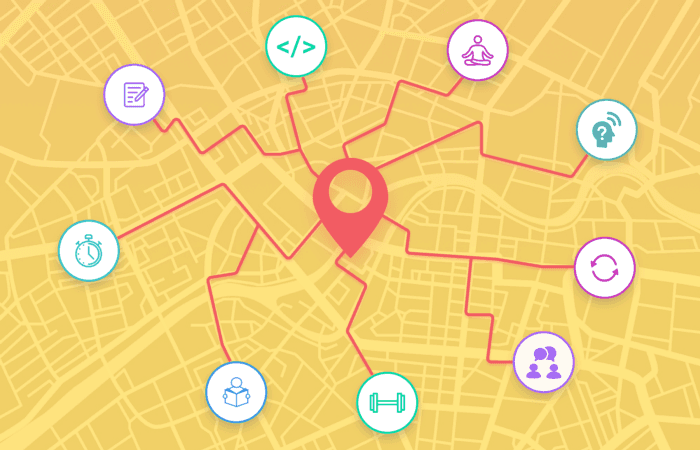Technical interviews are a nightmare. You can trust me; I have done a bunch of them lately. They're much more challenging than the actual job and are pretty awful at predicting if someone is a good fit.
But it is what it is. We can't do much to change the interview process. What we can do is learn how to win an interview game. And with the proper preparation and mindset, it's possible to ace them and land multiple job offers.
Here's how I did it and how you can too.
How Technical interviews look right now
Before we jump into tips and tricks, we need to understand what modern interviews look like. All of the positions I applied to were senior front-end roles. I applied only for remote or hybrid roles, so the whole process was online.
That's the only thing these interviews had in common.
This switch to online interviews disrupted the hiring processes. There is no standardized model, at least in small to medium sizes companies I applied to. Every process is very different; I experienced things ranging from coding in Google Docs to answering online tests while sharing the screen to a fast series of dozens of small technical questions.
The bottom line is — you need to be ready for everything. Luckily, this same approach can help you irrespectively from the task.
How do you win
Time for some tricks. There are two main components to winning an interview — preparation and mindset.
Preparation
You may think that preparation is everything; after all, you can't answer any questions if you don't know the answers. But that's only partly true. Preparation is essential, but in fact, you've been preparing for years — it's your job experience that matters.
Also, recruiters are aware that candidates don't know everything — your knowledge is important, but how you react to obstacles and things you don't know is critical.
Still, preparation is important. So you need to learn something about the most common technical questions that are likely to come up. The list includes questions about programming languages, frameworks, problem-solving, and technical design questions.
Almost all the questions I got can be found on the first page of Google results when you look for something akin to "react developer interview questions." That's usually everything you need to prepare.
Be especially wary of simple language features you're rarely using directly. For example, it's surprising how difficult it is to remember JavaScript promise syntax if you have used wrappers exclusively for the last few years. This same goes with other language features you're rarely using. For example, for me, it was JavaScript classes.
Depending on the position, you might also need to prepare answers to questions about algorithms or system design. Here too, the first page of Google results should be enough to get you almost every position.
Preparing your knowledge is one thing. You also need to present it in a good way. So practice explaining your answers out loud. Make sure you can articulate them clearly and concisely. Put additional effort into learning to code and explain what you're doing at this same time. It's surprisingly hard, especially if you're stressed. But a little bit of preparation can help immensely.
Mindset
Let's talk mindset. The first thing to remember — the interview is a conversation. You can (and should!) ask questions and engage the interviewer. The more interest and desire to learn you show, the better.
I always ask how a particularly difficult problem is solved in the organization. It could be CI/CD pipeline, managing the complexity of micro frontends, or even how they do code reviews.
Asking questions shows you're interested and know what might be challenging. So don't be afraid; treat the recruiter as your peer, not your boss.
Sometimes you'll get a question you don't know the answer to. That's perfectly normal. Your response should be honest. Don't bluff your way or pretend you know something you don't. Having areas to improve is expected; nobody makes a problem out of it.
Of course, admitting you don't know something is not enough. What's important is showing a positive attitude and a willingness to learn. When you don't know the answer to a question, make sure to explain your thought process and how you would go about finding the solution. This shows you're proactive and able to think on your feet.
If you want a job, it's often not enough to answer the question. Explaining your thinking process is as relevant. Describing your thinking process out loud when tackling technical questions or problems is like a superpower. There's nothing more important to the recruiter than having insight into your problem-solving process.
By describing your thinking process out loud, you'll give the interviewer a better idea of how you approach problems and make decisions. This can be especially helpful if you're unable to come up with a complete solution, as it shows that you can break down a problem and identify the key issues.
It's okay to pause and take a moment to organize your thoughts before explaining them, as this can make your explanation more precise and concise.
One final tip is to base answers on your own experiences as much as possible. Rather than just reciting facts or theory, give concrete examples of projects you worked on and problems you solved. This helps bring answers to life and makes them more memorable for the interviewer.
By following these tips, I was able to land five job offers after five technical interviews. With the proper preparation and mindset, you can do the same. Remember to be prepared, treat the interview as a conversation, show a positive attitude and willingness to learn, be honest, and base your answers on your experiences. Good luck!






